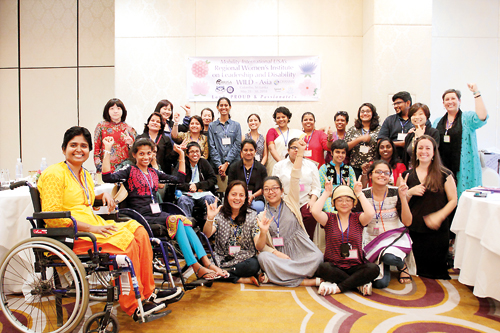Shedding the labels of deaf, blind or disabled women

Delegates of WILD (Pic by Purnima de Silva)
Sunitha’s name is translated into ‘a woman of well conduct’. Being born to deaf and illiterate parents in India, did not hinder her from shaping her own destiny. Sunitha herself has a hearing disability, yet her accomplishments have far outstripped her problems.
True to her name, Rama has turned out to be a goddess to her own community. Founder Chairperson of the Disabled Women Association of Nepal, Rama is committed to advocacy on disability rights.
Our own Sandamali- necklace of moonshine as her name suggests, has illuminated her life despite her vision impairment. Employed as a computer instructor at a private firm, Sandamali is today committed to empowering others with disabilities.
Shedding the labels of a ‘deaf, blind or disabled woman’, the delegates of the WILD (Women’s Institute on Leadership and Disability) Asia 2018 were proclaiming loud and clear that their unique identities emerge superior to the tags attached to them by society. Sharing with fellow participants, what their names translate into, during the session on ‘accomplishments and challenges’ of the eight-day interactive workshop in Colombo, the 15 delegates from India, China, Nepal and Sri Lanka, justified the dictum of the WILD – ‘Loud, Proud and Passionate’.
Initiated by Mobility International USA (MIUSA) together with the Employers’ Federation of Ceylon (EFC), the Colombo programme held end May, marked MIUSA’s first-time presence in Asia. “We have a very highly respected network of WILD alumni in the region and we realized that Sri Lanka specifically has the expertise needed to carry out this programme,” Project Manager, WILD, Susan Dunn, told the Sunday Times.
She further remarked that having a model in place, which “moves beyond identifying problems” is imperative. “The WILD model builds confidence and skills of women with disabilities to name and combat discrimination while at the same time, gaining personal and professional experiences that prepare them to soar into new heights as leaders.” To accomplish this, disabled women leaders need to feel positive about themselves, their bodies and their potential, says Susan. “This is what our motto Loud, Proud and Passionate’ is all about.”
A US-based non-profit organization, MIUSA is committed to empower people with disabilities around the world to achieve their human rights through international exchange and international development. MIUSA’s training sessions are fashioned to prepare people with disabilities to take leadership in advocating for inclusion across a wide range of sectors, including education, employment, micro enterprise, violence prevention, access to health care, technology and policy making.
Calling for increased civil society partnership in championing a better world for those with disabilities, Susan further noted: “disability inclusion is everyone’s issue, just the same as women’s empowerment, environmental justice, etc. We all must support one another, move out of our silos and work together for a better world. WILD-Asia is one of the ways in which we’re creating a world as it should be.” Citing The Gender, Disability and Development Institute, a component of WILD, as an excellent example of leaders from the disability community and other civil society actors coming together to share information and strategies to change policies and practices, she further remarked that this mutual learning and collaboration will lead to full inclusion of women with disabilities in society.
In tune with MIUSA’s mandate, the participants of the WILD, as its Project Manager explains, are to be equipped to share their confidence, skill and practical strategies with other girls and women with disabilities in their home communities. Endorsing this, the Manager of the Disability Network, EFC, and the local trainer for the WILD Asia, Manique Gunaratne says that WILD encourages its delegates to become “agents of change” by empowering those with disabilities at the grass root level.
“A woman with a disability is triple-handicapped- firstly for being a woman, secondly for having a disability and thirdly for not being empowered.” The delegates of the workshop, as Manique explains, were selected through an ‘open application’ process and reviewed by a panel. Four local delegates were among them.
The programme which was also a celebration of diversity and mutual learning and sharing, enabled a dialogue among the participants in areas such as education, gender equality, economic empowerment, reproductive health and policy change, bringing with them their expertise in these fields. Adding further character to the programme were the sessions on yoga and self defence, cultural events and the MIUSA’s photo exhibition, themed Brilliant & Resilient: Celebrating the Power of Disabled Women Activists. This international travelling exhibition featured portraits and vignettes of 30 women activists with disabilities from around the world.
The workshop, as Manique points out further, was also aligned with the EFC’s vision of promoting social harmony through productive employment. The EFC is the national employers’ organization and the employer constituent for Sri Lanka in the ILO through its membership of employers drawn from a multitude sectors. The EFC’s Network on Disability and its disability resource centre which is internationally accredited, serves as a link between the business community and the organizations dealing with disability issues to facilitate mainstreaming its work. The WILD programme was supported by the Channel Foundation and MIUSA’s Women’s Leadership Fund.


